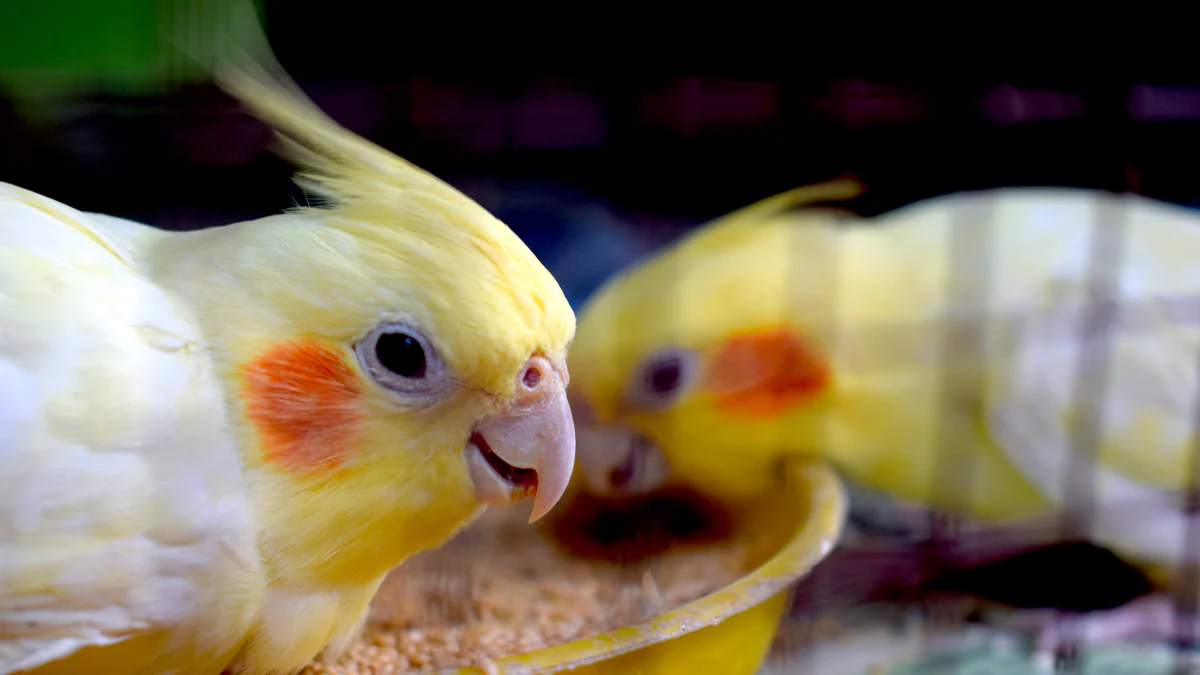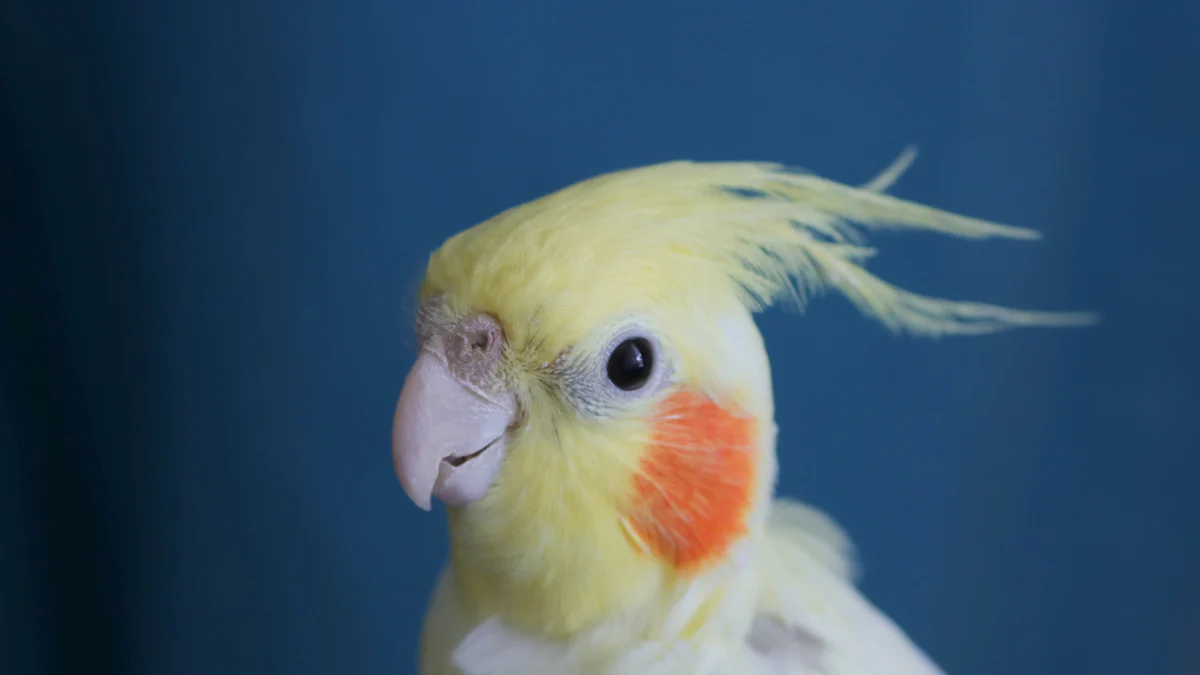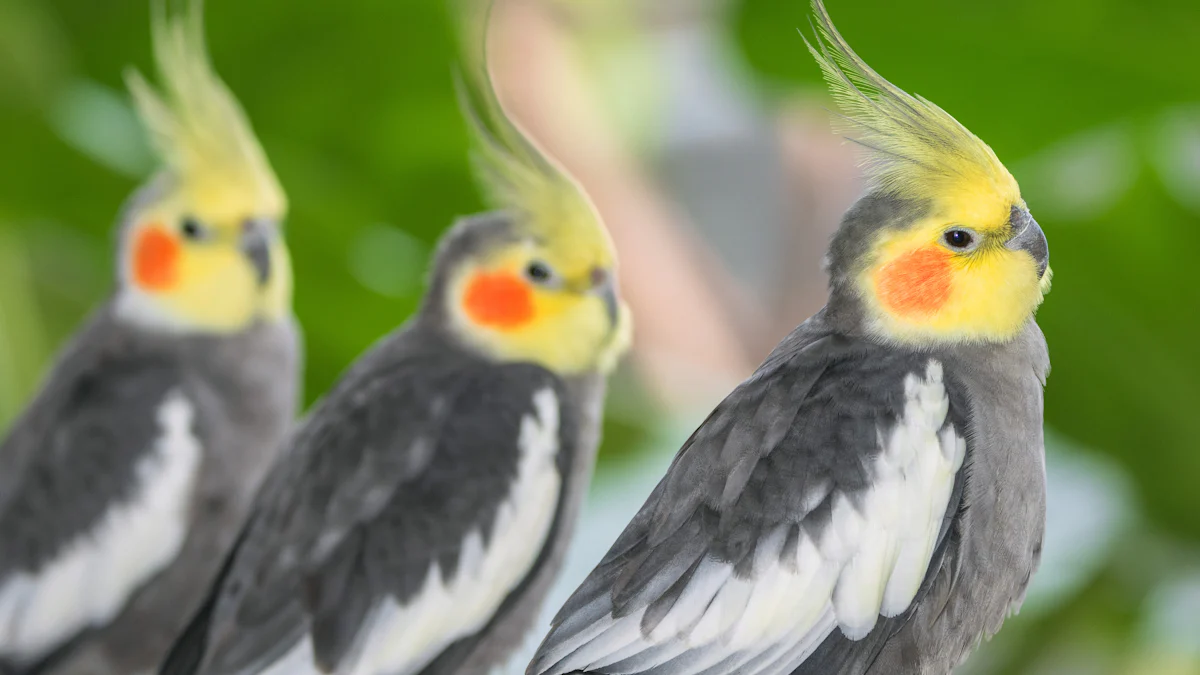
Cockatiels, being omnivorous birds, benefit from a varied diet that includes seeds, fruits, and insects. One excellent option is cockatiels dried mealworms, which serve as a protein-rich treat. These crunchy snacks provide vital nutrients such as fatty acids, vitamins, and minerals, making them a valuable addition to their diet. However, it’s important to feed cockatiels dried mealworms in moderation to maintain a proper nutritional balance. Introducing dried mealworms gradually allows them to adjust while enjoying the added variety. For personalized guidance, consulting a veterinarian ensures their overall health and well-being.
Key Takeaways
- Dried mealworms are a protein-rich treat for cockatiels, providing essential nutrients that support their energy levels and overall health.
- Introduce dried mealworms gradually to your cockatiel’s diet to help them adjust and minimize the risk of digestive issues.
- Feed dried mealworms in moderation—no more than two to three times a week—to maintain a balanced diet and prevent obesity.
- Monitor your cockatiel’s reactions to mealworms, as individual preferences may vary; adjust serving sizes based on their appetite and health.
- Ensure the quality of dried mealworms by purchasing from reputable suppliers and storing them properly to avoid contamination.
- A varied diet is crucial for cockatiels; dried mealworms should complement their primary food sources, not replace them.
- Consult with a veterinarian for personalized dietary advice to ensure your cockatiel remains healthy and happy.
Nutritional Benefits of Cockatiels Dried Mealworms

Protein and Energy Boost
Cockatiels thrive on a diet that provides them with the energy to stay active and healthy. Dried mealworms stand out as a powerhouse of protein, containing an impressive 48% to 54% protein content. This high protein level supports muscle development, feather health, and overall vitality. For cockatiels, which are naturally energetic birds, this protein boost ensures they maintain their playful and curious nature.
In addition to protein, dried mealworms offer a significant amount of fat, approximately 28%. This fat content serves as a concentrated energy source, especially beneficial during colder months or molting periods when cockatiels require extra energy. The combination of protein and fat makes dried mealworms an excellent occasional treat to fuel their daily activities.
Essential Vitamins and Minerals
Dried mealworms are not just about protein; they also pack a punch when it comes to essential vitamins and minerals. These tiny treats contain Vitamin B12, which plays a crucial role in maintaining a healthy nervous system and supporting red blood cell production. Vitamin E, another key nutrient found in dried mealworms, acts as a powerful antioxidant, protecting cockatiels from cellular damage and promoting a robust immune system.
Minerals like Calcium, Iron, and Zinc further enhance the nutritional profile of dried mealworms. Calcium contributes to strong bones and beaks, while Iron supports oxygen transport in the blood. Zinc aids in feather quality and overall growth. By incorporating cockatiels dried mealworms into their diet, bird owners can provide these vital nutrients in a natural and enjoyable way.
“Dried mealworms are a nutritional goldmine for cockatiels, offering a balanced mix of protein, energy, and essential nutrients,” as highlighted by studies on their nutritional value.
However, moderation remains key. Overfeeding dried mealworms can lead to an imbalance in their diet, so these should complement, not replace, their regular food. A varied diet ensures cockatiels receive all the nutrients they need to stay healthy and happy.
How to Introduce Cockatiels Dried Mealworms to Their Diet
Start Gradually
Introducing cockatiels dried mealworms into their diet requires patience and a step-by-step approach. Birds unfamiliar with insects might hesitate at first. Offering a small amount initially allows them to explore the new treat without overwhelming their senses. Place a few dried mealworms in their feeding dish alongside their regular food. This method encourages curiosity while ensuring they don’t feel forced to try something unfamiliar.
“If your cockatiel has never consumed insects before, it might be wise to start with dried mealworms to see how they respond,” suggests avian veterinarians. Observing their reaction during this phase helps determine if they enjoy the taste and texture. Gradual introduction also minimizes the risk of digestive discomfort, ensuring a smooth transition.
Monitor Preferences and Reactions
Every cockatiel has unique preferences, and their reactions to new foods can vary. Some may eagerly devour dried mealworms, while others might need more time to adjust. Watch for signs of enjoyment, such as enthusiastic pecking or chirping. On the other hand, if they seem disinterested or leave the mealworms untouched, consider mixing them with familiar foods to spark interest.
Pay close attention to their health and behavior after consuming dried mealworms. Look for any signs of allergies or digestive issues, such as changes in droppings or unusual lethargy. If any adverse reactions occur, discontinue feeding and consult a veterinarian. Regular monitoring ensures that cockatiels benefit from the nutritional value of dried mealworms without compromising their well-being.
Ensure Quality and Proper Storage
The quality of dried mealworms plays a crucial role in their safety and nutritional value. Always choose mealworms from reputable suppliers to avoid contamination or spoilage. High-quality dried mealworms should have a fresh, crunchy texture and a natural aroma. Avoid products with an off-putting smell or visible mold, as these could harm your bird.
Proper storage is equally important. Keep dried mealworms in an airtight container to maintain freshness and prevent moisture buildup. Store them in a cool, dry place away from direct sunlight. This practice preserves their nutritional content and ensures they remain a safe treat for your cockatiel. By prioritizing quality and storage, bird owners can confidently incorporate dried mealworms into their pet’s diet.
“Mealworms are an excellent option for cockatiels,” as experts often highlight. However, ensuring their quality and proper handling guarantees that these treats remain beneficial and enjoyable.
Feeding Guidelines for Cockatiels Dried Mealworms

Frequency and Portion Sizes
Cockatiels enjoy variety in their diet, and dried mealworms can serve as a delightful treat. However, offering them too frequently may disrupt the balance of nutrients they need. Experts recommend feeding cockatiels dried mealworms no more than two to three times a week. This frequency ensures they receive the nutritional benefits without overloading on protein or fat.
Portion sizes matter just as much as frequency. A small handful of dried mealworms, roughly 5 to 10 pieces, is sufficient for a single serving. This amount provides a healthy boost of protein and energy without overwhelming their digestive system. For smaller cockatiels or those new to mealworms, start with fewer pieces and adjust based on their appetite and activity level.
“Mealworms are an excellent option for cockatiels,” avian specialists often note, but moderation is key to maintaining a well-rounded diet.
Avoiding Overfeeding
Overfeeding dried mealworms can lead to several issues, including obesity and nutritional imbalances. Cockatiels require a diet that includes high-quality pellets, fresh fruits, vegetables, and occasional treats like mealworms. Relying too heavily on mealworms may cause them to miss out on essential nutrients found in other food sources.
To avoid overfeeding, monitor your cockatiel’s overall diet. Keep track of how often and how much they consume dried mealworms. If they seem overly eager for mealworms and ignore their regular food, reduce the frequency of this treat. Observing their weight and energy levels also helps ensure they remain healthy.
“Although mealworms are nutritious, they should not be the primary food source for cockatiels,” as highlighted by avian dietary guidelines. A varied diet supports their long-term health and vitality.
By following these feeding guidelines, bird owners can confidently include dried mealworms in their cockatiel’s diet. Proper portion control and mindful feeding practices ensure these treats remain a beneficial addition rather than a dietary concern.
Potential Risks of Feeding Cockatiels Dried Mealworms
Overfeeding and Imbalance
Feeding cockatiels dried mealworms excessively can disrupt their nutritional balance. These treats, while rich in protein and fat, lack other essential nutrients like fiber and calcium. Cockatiels thrive on a diverse diet that includes seeds, fruits, vegetables, and high-quality pellets. Overloading their meals with dried mealworms may lead to deficiencies in vital nutrients.
Excess protein and fat from frequent mealworm consumption can result in weight gain or even obesity. Cockatiels, being active birds, require energy but not at the expense of their overall health. Studies on Nutritional Value and Safety Evaluation of Insects in Animal Feed highlight the potential for energy imbalances when insect-based foods dominate a bird’s diet. To avoid this, owners should limit mealworms to occasional treats rather than daily staples.
“Moderation is key when feeding dried mealworms,” experts often advise. A balanced diet ensures cockatiels receive all the nutrients they need to stay healthy and vibrant.
Allergies or Digestive Sensitivities
Cockatiels, like humans, can have unique dietary sensitivities. Introducing dried mealworms without caution may trigger allergic reactions or digestive discomfort. Symptoms such as changes in droppings, lethargy, or unusual behavior could indicate an adverse reaction. Observing these signs early helps prevent further complications.
The study Safety of Dried Mealworms for Cockatiels confirms that dried mealworms are generally safe. However, individual birds may still experience sensitivities. Gradual introduction allows owners to monitor their cockatiel’s response. If any issues arise, discontinuing the treat and consulting an avian veterinarian becomes essential.
“Every cockatiel is unique,” as avian specialists emphasize. Paying attention to their preferences and health ensures a positive feeding experience.
Proper storage of dried mealworms also plays a role in preventing risks. Poorly stored mealworms may develop mold or attract pests, which can harm cockatiels. Keeping them in airtight containers and checking for freshness ensures safety and quality. By taking these precautions, owners can minimize potential risks and provide their feathered friends with a safe and enjoyable treat.
Dried mealworms provide cockatiels with a safe and nutritious treat when offered in moderation. These protein-packed snacks complement their omnivorous diet, which naturally includes seeds, fruits, and insects. A varied diet ensures cockatiels receive essential nutrients like fiber, vitamins, and minerals for optimal health. Gradually introducing dried mealworms helps birds adapt while minimizing potential risks such as digestive issues or allergies. Responsible feeding practices, paired with regular consultation with an avian veterinarian, guarantee a balanced and enjoyable diet for your feathered friend. Treats like cockatiels dried mealworms should enhance, not replace, their primary food sources.
FAQ
Can cockatiels eat mealworms?
Yes, cockatiels can eat mealworms, and many of them enjoy the crunchy texture. Mealworms provide a fantastic source of protein, which supports muscle health and energy levels. However, cockatiels only need a small amount of protein from mealworms. Overfeeding can lead to an unbalanced diet, so moderation is essential.
Are cockatiels dried mealworms safe for daily feeding?
Dried mealworms are safe for cockatiels but should not be part of their daily diet. These treats are rich in protein and fat, which can cause weight gain or nutritional imbalances if consumed too often. Offering dried mealworms two to three times a week ensures they remain a healthy supplement rather than a dietary staple.
How should dried mealworms be introduced to a cockatiel’s diet?
Introduce dried mealworms gradually to avoid overwhelming your bird. Start by offering a few pieces alongside their regular food. This approach allows them to explore the new treat at their own pace. Gradual introduction also helps prevent digestive issues, ensuring a smooth transition.
What are the benefits of feeding cockatiels dried mealworms?
Dried mealworms provide cockatiels with a protein boost, essential for maintaining energy and feather health. They also contain vitamins like B12 and E, along with minerals such as calcium and zinc. These nutrients support strong bones, a robust immune system, and vibrant plumage.
Can cockatiels have allergic reactions to mealworms?
Some cockatiels may experience allergies or digestive sensitivities when trying new foods, including mealworms. Signs of an adverse reaction include changes in droppings, lethargy, or unusual behavior. If any of these symptoms appear, stop feeding mealworms and consult an avian veterinarian.
How often should cockatiels eat dried mealworms?
Cockatiels should eat dried mealworms no more than two to three times a week. Each serving should consist of 5 to 10 mealworms, depending on the bird’s size and activity level. This frequency ensures they receive the nutritional benefits without overloading on protein or fat.
What should I do if my cockatiel refuses to eat dried mealworms?
If your cockatiel seems uninterested in dried mealworms, try mixing them with familiar foods like seeds or pellets. This technique can encourage curiosity and make the new treat more appealing. Patience is key, as some birds take time to adjust to unfamiliar textures or flavors.
Are there risks to feeding cockatiels dried mealworms?
Overfeeding dried mealworms can lead to obesity and nutritional imbalances. These treats lack fiber and other essential nutrients found in fruits, vegetables, and pellets. Additionally, poor-quality or improperly stored mealworms may pose health risks. Always choose high-quality products and store them in airtight containers.
Can dried mealworms replace other protein sources in a cockatiel’s diet?
Dried mealworms should not replace other protein sources. Cockatiels thrive on a varied diet that includes seeds, fruits, vegetables, and high-quality pellets. Mealworms serve as an occasional treat to complement their primary food sources, not as a substitute.
Do cockatiels enjoy eating dried mealworms?
Many cockatiels enjoy the crunchy texture and unique flavor of dried mealworms. These treats can add excitement to their diet while providing valuable nutrients. Observing your bird’s reaction can help determine if they find mealworms enjoyable.


